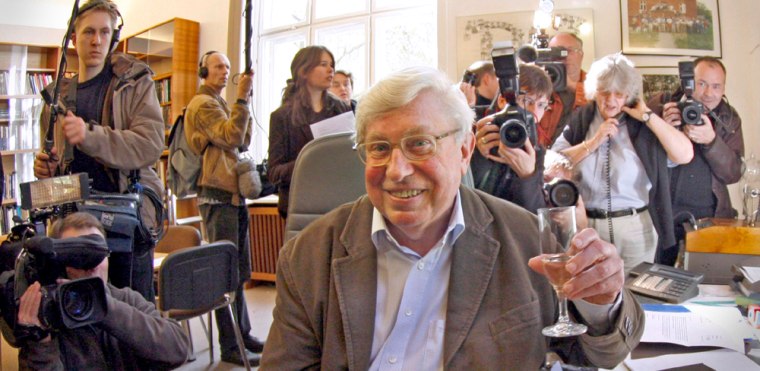Gerhard Ertl of Germany won the 2007 Nobel Prize in chemistry on Wednesday for studies of chemical reactions on solid surfaces, which are key to understanding questions such as how pollution eats away at the ozone layer.
Ertl’s research laid the foundation of modern surface chemistry, which has helped explain how fuel cells produce energy without pollution, how catalytic converters clean up car exhaust and even why even why iron rusts, the Royal Swedish Academy of Sciences said.
His work has paved the way for development of cleaner energy sources and will guide the development of fuel cells, said Astrid Graslund, secretary of the Nobel Committee for Chemistry.
Ertl, who won the prize on his 71st birthday, told reporters that it “is the best birthday present that you can give to somebody.”
“I am speechless,” Ertl told The Associated Press from his office in Berlin. “I was not counting on this.”
Ertl is an emeritus professor at the Fritz Haber Institute of the Max Planck Society in Berlin.
The academy said Ertl provided a detailed description of how chemical reactions take place on surfaces and studied some of the most fundamental mysteries in that field.
Ertl showed how to obtain reliable results in this difficult area of research, and his findings applied in both academic studies and industrial development, the academy said.
“Surface chemistry can even explain the destruction of the ozone layer, as vital steps in the reaction actually take place on the surfaces of small crystals of ice in the stratosphere,” the award citation said.
Americans Mario R. Capecchi and Oliver Smithies, and Briton Sir Martin J. Evans, won the 2007 Nobel Prize in medicine on Monday for groundbreaking discoveries that led to a powerful technique for manipulating mouse genes.
On Tuesday, France’s Albert Fert and German Peter Gruenberg won the physics award for discovering a phenomenon that lets computers and digital music players store reams of data on ever-shrinking hard disks.
Prizes for literature, peace and economics will be announced through Oct. 15.
The awards — each worth $1.5 million — will be handed out by Sweden’s King Carl XVI Gustaf at a ceremony in Stockholm on Dec. 10.
